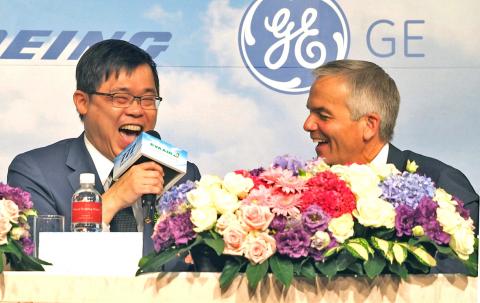EVA Airways Corp (長榮航空) yesterday signed a NT$50 billion (US$1.6 billion) deal with Boeing Co to procure five new freight aircraft.
The Taiwanese carrier is expected to receive the first of five Boeing 777 Freighters in October 2017 and have all five in operation by September 2019, EVA Air chairman Chang Kuo-wei (張國煒) said.
The 777 Freighter uses about 20 percent less fuel than the older Boeing 747-400 cargo aircraft in the company’s fleet, Chang said.

Photo: EPA
He said that it is crucial for the company to modernize its fleet, as the cargo sector is beset by dwindling margins and declining transport volume.
“The Boeing 747-400 is no longer the ideal choice, as there is no longer enough demand to fill it to capacity on each flight,” Chang said, adding that the 777 Freighter’s smaller capacity of 85 to 90 tonnes affords much more flexibility.
The new aircraft also shares many characteristics with other 777 series aircraft in EVA Air’s fleet, which will allow pilots to easily switch between flying cargo and passenger aircraft and simplify maintenance, he said.
EVA Air also plans to purchase 24 to 26 passenger aircraft in 2018 or 2019, which is expected to be one of the carrier’s largest procurement bids ever, Chang said.
The company is considering the Boeing 787 and the Airbus A350, and has urged Boeing senior vice president John Wojick to provide a more “friendly” price in the upcoming purchase, he said.
In light of the carrier’s lengthy history with Boeing aircraft powered by General Electric Co (GE) engines, Chang said that the 787 would be the ideal choice, as the A350 is powered by Rolls-Royce PLC engines, which would complicate maintenance.
Growth prospects are expected to be constrained for its maintenance business, he said.
“In terms of engine maintenance, many manufacturers are requiring clients to use their own first-party services or risk having their warranties voided, leaving other operators out of the picture,” Chang said.
Evergreen Aviation Precision Corp (EGAP, 長榮航與精密), an affiliated business of EVA Airways, has started shipments of its rigid cargo barriers for Boeing freight aircraft and has delivered 11 units since December last year as part of a contract that runs through 2019, he said.
GE awarded EGAP a six-year contract to supply 45 parts for the US company’s next-generation LEAP (leading-edge aviation propulsion) engine, he added.
Chang said the Taiwanese firm is striving to establish a vertically integrated aviation supply chain, aiming to tap into the market for aircraft parts assembly.

In a small town in Paraguay, a showdown is brewing between traditional producers of yerba mate, a bitter herbal tea popular across South America, and miners of a shinier treasure: gold. A rush for the precious metal is pitting mate growers and indigenous groups against the expanding operations of small-scale miners who, until recently, were their neighbors, not nemeses. “They [the miners] have destroyed everything... The canals, springs, swamps,” said Vidal Britez, president of the Yerba Mate Producers’ Association of the town of Paso Yobai, about 210km east of capital Asuncion. “You can see the pollution from the dead fish.

MULTIFACETED: A task force has analyzed possible scenarios and created responses to assist domestic industries in dealing with US tariffs, the economics minister said The Executive Yuan is tomorrow to announce countermeasures to US President Donald Trump’s planned reciprocal tariffs, although the details of the plan would not be made public until Monday next week, Minister of Economic Affairs J.W. Kuo (郭智輝) said yesterday. The Cabinet established an economic and trade task force in November last year to deal with US trade and tariff related issues, Kuo told reporters outside the legislature in Taipei. The task force has been analyzing and evaluating all kinds of scenarios to identify suitable responses and determine how best to assist domestic industries in managing the effects of Trump’s tariffs, he

TIGHT-LIPPED: UMC said it had no merger plans at the moment, after Nikkei Asia reported that the firm and GlobalFoundries were considering restarting merger talks United Microelectronics Corp (UMC, 聯電), the world’s No. 4 contract chipmaker, yesterday launched a new US$5 billion 12-inch chip factory in Singapore as part of its latest effort to diversify its manufacturing footprint amid growing geopolitical risks. The new factory, adjacent to UMC’s existing Singapore fab in the Pasir Res Wafer Fab Park, is scheduled to enter volume production next year, utilizing mature 22-nanometer and 28-nanometer process technologies, UMC said in a statement. The company plans to invest US$5 billion during the first phase of the new fab, which would have an installed capacity of 30,000 12-inch wafers per month, it said. The

ASML Holding NV, the sole producer of the most advanced machines used in semiconductor manufacturing, said geopolitical tensions are harming innovation a day after US President Donald Trump levied massive tariffs that promise to disrupt trade flows across the entire world. “Our industry has been built basically on the ability of people to work together, to innovate together,” ASML chief executive officer Christophe Fouquet said in a recorded message at a Thursday industry event in the Netherlands. Export controls and increasing geopolitical tensions challenge that collaboration, he said, without specifically addressing the new US tariffs. Tech executives in the EU, which is